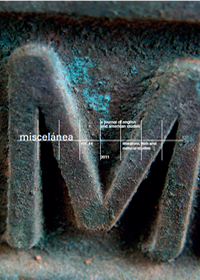Through the Eye of a Postmodernist Child: Ian McEwan’s "Homemade”
DOI:
https://doi.org/10.26754/ojs_misc/mj.20119093Palabras clave:
McEwan, Homemade, Infancia, Relato breve, PosmodernismoResumen
Del romanticismo en adelante, la infancia se ha construido como alternativa al mundo alienante del progreso moderno. Aún cuando esta versión idealizada de la infancia consagrada en la literatura romántica se puso en cuestión ya a finales del siglo XIX, la perspectiva que el niño tiene sobre el mundo adulto se siguió y se sigue considerando un modo útil de explorar deficiencias sociales y de poner en evidencia algunos de sus aspectos más desagradables. Los autores de este ensayo trazan las líneas maestras de la transformación de la concepción de la infancia para luego centrarse en “Homemade” de Ian McEwan, el relato inicial de la colección First Love, Last Rites (1975) que constituyó el debut literario del autor. La naturaleza particularmente malvada del niño protagonista así como su frustrada transición a la vida adulta luego de su primera y única experiencia sexual (la violación de su propia hermana) se ponen en relación causal con la profunda transformación del modelo tradicional de autoridad paterna en el periodo posmoderno que genera un tipo de subjetividad cínica y perversa que, sin embargo, se caracteriza paradójicamente por su incapacidad para gozar.Descargas
Referencias
Abrams, M.H. 1973. Natural Supernaturalism. Tradition and Revolution in Romantic Literature. New York: Norton.
Abrams, M.H., et al. (eds.) 1979. The Norton Anthology of English Literature. Vol. 2. New York: Norton.
Bruhm, Steven and Natasha Hurley (eds.) 2004. Curioser. On the Queerness of Children. Minneapolis and London: University of Minnesota Press.
Bruhm, Steven. 2006. “Nightmare on Sesame Street, or The Self-Possessed Child”. Gothic Studies 8 (2): 98-113.
Butler, Judith. 1993. Bodies that Matter. On the Discursive Limits of “Sex”. New York: Routledge.
Childs, Peter. 2006. The Fiction of Ian McEwan. A Reader’s Guide to Essential Criticism. Basingstoke: Palgrave Macmillan.
Coveney, Peter. 1957. The Image of Childhood. The Individual and Society, A Study of Theme in English Literature. Harmondsworth: Penguin.
Freud, Sigmund. (1911) 2001. “Formulations on the Two Principles of Mental Functioning”. The Standard Edition of the Complete Works of Sigmund Freud. Vol. XII (1911-1913). Trans. J. Strachey. London: Vintage: 218-226.
—. (1903) 1995. “Three Contributions to the Theory of Sex”. The Basic Writings of Sigmund Freud. Trans. A. A. Brill. New York: The Modern Library: 509-597.
Hutcheon, Linda. 1988. A Poetics of Postmodernism, London, Routledge.
Jameson, Fredric. 1991. Postmodernism, or the Cultural Logic of Late Capitalism. London: Verso.
Kuhn, Reinhard. 1982. Corruption in Paradise. The Child in Western Literature. Hanover: University Press of New England.
Louvel, Liliane, Gilles Ménégaldo, and Anne-Laure Fortin. 1995. “An Interview with Ian McEwan”. Etudes Britanniques Contemporaines 8: 1-18.
McEwan, Ian. (1975) 1976. First Love, Last Rites. London: Picador.
March-Russell, Paul. 2009. The Short Story. An Introduction. Edinburgh: Edinburgh U.P.
Pearson, Maeve. 2007. “Re-exposing the Jamesian Child: The Paradox of Children’s Privacy”. The Henry James Review 28 (2): 101-119.
Schiller, Friedrich. (1794) 2004. On the Aesthetic Education of Man in a Series of Letters. Trans. R. Snell. Mineola, New York: Dover.
Ziolkowski, Eric. 2001. Evil Children in Religion, Literature, and Art. Basingstoke: Palgrave.
Žižek, Slavoj. 1991. For They Know not What They Do. Enjoyment as a Political Factor. London: Verso.
—. 1992. Enjoy Your Symptom! Jacques Lacan in Hollywood and Out. London: Verso
—. 1999. The Ticklish Subject. The Absent Centre of Political Ontology. London: Verso.
Descargas
Publicado
Número
Sección
Licencia

Esta obra está bajo una licencia internacional Creative Commons Atribución-NoComercial 4.0.


